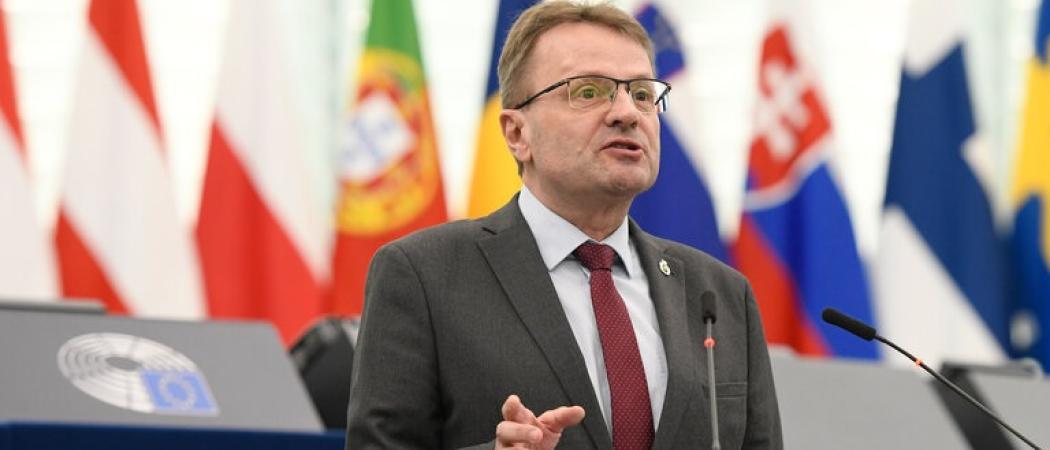The Swiss want to re-join EU’s €26 billion education mobility programme. The wider political relationship is still on the rocks but MEPs are looking to plot a way forward

Hannes Heide MEP, the Culture and Education committee's rapporteur on Erasmus+. Photo: European Parliament
The European Parliament is poised to put its weight behind calls for Switzerland to become a full member of the EU’s €26 billion Erasmus+ education mobility programme, with the Culture and Education committee preparing an opinion to feed into a wider Parliament report on EU-Swiss relations. The draft sends a clear signal that Switzerland joining Erasmus+ would be a win-win.
Students inside and outside Switzerland have been pushing for full membership for years. In 2020, a petition by the Swiss Student Union gathered more than 10,000 signatures. EU students have also been vocal. In the most recent statement in February, the European Students’ Union called on the EU to decouple politics and education, saying “students cannot be used as bargaining chips.”
The EU isn’t opposed to Switzerland joining but not before the two sort out the details of their strained relationship, which took a turn for the worse when the Swiss walked away from the negotiations on a joint cooperation framework in 2021.
“We look forward to the full association of Switzerland to Erasmus+, but as part of the full package of measures that would consolidate and further strengthen our relations with Switzerland,” said Filip Van Depoele, head of unit for international cooperation at the Commission's education and culture directorate, at a meeting of the Parliament committee.
MEPs are more phlegmatic. “We shouldn’t simply have the reflex of saying we want to make this conditional on institutional negotiations,” said the committee’s rapporteur for the opinion Hannes Heide. “Young people shouldn’t be a football of political interest.”
Erasmus+ prides itself on creating links around Europe and beyond, and MEPs believe the door to the programme should remain open to EU neighbours. Heide says Wales, Scotland and Northern Ireland have expressed interest in one form or another. “We need to be able to change standpoints,” he urged.
Free movement
Switzerland left Erasmus+ in 2014 after the Swiss voted in favour of introducing limits to immigration, which was at odds with the free movement agreement the country had with the EU.
Since then, Switzerland has run its own version of the programme, funding thousands of exchanges for both EU and Swiss students. At the same time, Swiss institutions have also been able to take part in some parts of Erasmus+ as an equal partner, such as the European university initiative.
Technically, cooperation is possible across the board, with Swiss institutions limited to acting as third-country project partners. But according to the European Students’ Union, this hasn’t allowed for equal opportunities: similarly-sized Austria participated in 11 times more Erasmus+ projects than Switzerland between 2014 and 2020.
The Swiss-European Mobility Programme “isn’t enough,” says the European Students’ Union. “The current lack of access to the Erasmus+ programme puts both European and Swiss young people at a disadvantage, especially in regards to the financial aid available for mobility.”
Van Depoele agreed the set up is “a sub-optimal solution.”
If there is agreement, Switzerland has all the structures in place, namely national agencies with the know-how, to quickly join the EU mobility programme. The Commission and the Swiss have been holding exploratory talks on their wider relationship since last March, trying to sort out their differences. And there’s been a new free movement agreement in place since 2016.
“I think it would be quite straightforward to revive the structures,” MEP Petra Kammerevert said.
But it doesn’t mean that the Swiss will get to pick and choose which parts of Erasmus+ to participate in. The Parliament is in favour of the Swiss joining, “But we can’t give them an à la carte solution,” said MEP Laurence Farreng.





 A unique international forum for public research organisations and companies to connect their external engagement with strategic interests around their R&D system.
A unique international forum for public research organisations and companies to connect their external engagement with strategic interests around their R&D system.